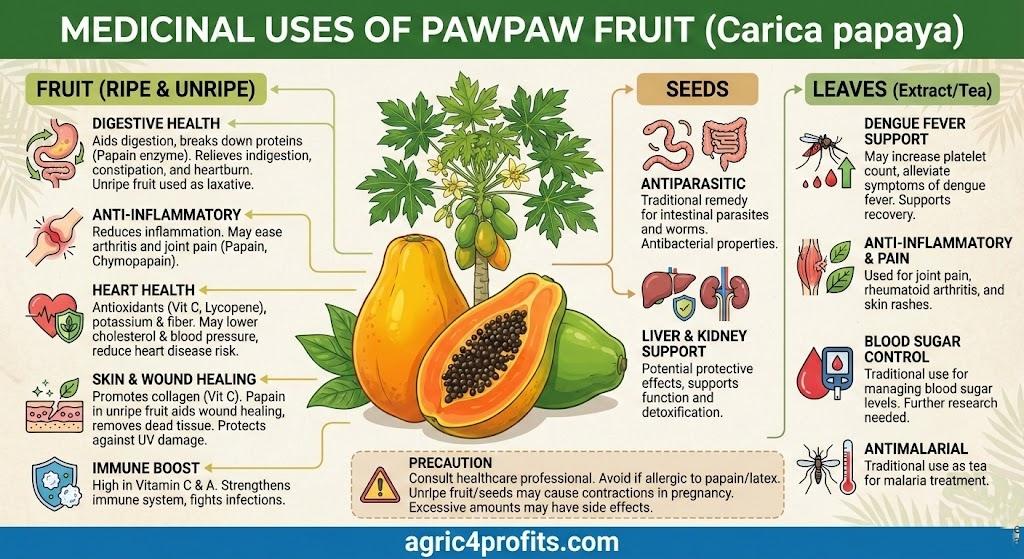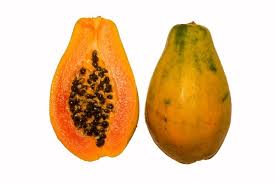The pawpaw fruit (Asimina triloba), also known as North American pawpaw, is a unique native fruit from the eastern United States with a creamy, custard-like texture and a tropical flavor blending banana, mango, and melon notes. Beyond its delicious taste, pawpaw offers notable nutritional and potential medicinal value through its antioxidants, vitamins, minerals, fiber, and unique bioactive compounds like annonaceous acetogenins, supporting digestive health, immunity, and more in traditional and emerging research contexts.
Pawpaw (Asimina triloba) is the largest edible fruit native to North America, historically used by indigenous peoples for food and remedies. The fruit, leaves, seeds, and bark contain phytochemicals with antioxidant, anti-inflammatory, and other properties. Modern interest focuses on its role in supporting overall wellness, though more human clinical studies are needed.
Nutritional Profile of Pawpaw Fruit
1. Rich in Vitamins: High in vitamin C (immune support and collagen production), vitamin A (vision and skin health), vitamin E (antioxidant protection), and various B vitamins.
2. Mineral Content: Good source of magnesium (muscle and nerve function), iron (oxygen transport and anemia prevention), manganese (metabolism and bone health), potassium (blood pressure regulation), and copper.
3. Dietary Fiber: Provides soluble and insoluble fiber for digestion, gut health, and satiety.
4. Low in Calories and Fat: Nutrient-dense with moderate protein and healthy fats, suitable for balanced diets.
5. Bioactive Compounds: Contains carotenoids, flavonoids, phenolic compounds (e.g., epigallocatechin, epicatechin, p-coumaric acid), and annonaceous acetogenins with potential therapeutic effects.
Read Also: Comprehensive Guide to Pig Farming Business for Profits
Antioxidant Properties of Pawpaw Fruit
1. Rich in Antioxidants: Loaded with vitamins C and E, beta-carotene, and phenolics that neutralize free radicals and reduce oxidative stress.
2. Protection Against Chronic Diseases: May lower risks of heart disease, diabetes, and cancer by combating cellular damage.
3. Skin Health Benefits: Supports collagen production, protects against UV and environmental damage, and reduces signs of aging like wrinkles.
4. Immune and Cellular Support: Enhances overall defense against oxidative stress for better long-term health.
5. Anti-Aging Effects: Promotes youthful skin and cellular integrity through free radical scavenging.
Digestive Health Benefits

1. High Fiber Content: Promotes regular bowel movements, prevents constipation, and supports gut microbiome.
2. Enzymes for Digestion: Contains papain-like enzymes that aid protein breakdown and nutrient absorption.
3. Relief from Digestive Disorders: Soothes indigestion, bloating, and discomfort with anti-inflammatory effects.
4. Gut Health Support: Fiber fosters beneficial bacteria and reduces gastrointestinal risks.
5. Natural Laxative: Gentle promotion of regularity without harsh effects.
Immune System Support
1. Boosts Immunity: High vitamin C stimulates white blood cell production to fight infections.
2. Antimicrobial Properties: Extracts inhibit certain bacteria and pathogens.
3. Anti-Inflammatory Effects: Reduces chronic inflammation for balanced immune response.
4. Infection Resistance: May help ward off colds, flu, and other illnesses.
5. Overall Resilience: Nutrients enhance the body’s natural defenses.
Anti-Inflammatory Effects
1. Reduces Inflammation: Flavonoids and phenolics lower inflammatory markers.
2. Pain Relief: May alleviate arthritis, muscle aches, and joint discomfort.
3. Supports Recovery: Reduces swelling and aids healing from injuries.
4. Chronic Condition Management: Helps mitigate risks of heart disease and neurodegenerative issues.
5. Joint Health: Improves mobility through inflammation reduction.
Read Also: Types of Pig Feeds and When to Feed Each
Potential Anticancer Properties
1. Rich in Antioxidants: Protects cells from DNA damage linked to cancer.
2. Unique Compounds: Acetogenins exhibit cytotoxic effects on cancer cells by inhibiting ATP production and tumor angiogenesis via HIF-1/VEGF pathways.
3. Anti-Inflammatory Effects: Reduces chronic inflammation as a cancer risk factor.
4. Cell Growth Inhibition: Studies show suppression of multidrug-resistant tumor cells and promotion of apoptosis.
5. Complementary Potential: Promising in lab/animal models, though human trials are limited and not a proven treatment.
Heart Health Benefits
1. Cholesterol Regulation: Fiber binds cholesterol to lower LDL levels.
2. Antioxidants for Heart Health: Protect blood vessels and reduce oxidative damage.
3. Potassium Content: Supports blood pressure regulation.
4. Vascular Function: Improves vessel health and reduces hypertension risk.
5. Cardiovascular Protection: Lowers risks of heart disease and stroke.
Blood Sugar Regulation
1. Low Glycemic Index: Causes gradual blood sugar rise.
2. Fiber Content: Slows sugar absorption for stability.
3. Nutrient-Rich Profile: Antioxidants may enhance insulin sensitivity.
4. Metabolic Support: Aids overall glucose management.
5. Diabetes-Friendly: Helps prevent spikes in balanced diets.
Skin Health and Pawpaw

1. Natural Moisturizer: Hydrates and retains skin moisture.
2. Anti-Aging Benefits: Reduces wrinkles and promotes elasticity.
3. Skin Healing Properties: Papain exfoliates and aids wound recovery.
4. Soothing Irritations: Reduces redness and inflammation.
5. Topical Uses: Effective in masks for glow and scar reduction.
Scientific Evidence and Case Studies on Pawpaw Fruit (Asimina triloba)

1. Anticancer effects: Acetogenins inhibit HIF-1 activation, suppress tumor angiogenesis, and kill multidrug-resistant cancer cells by depleting ATP; promising in lab models for breast and other cancers.
2. Antioxidant activity: Fruit pulp rich in phenolics, carotenoids, and vitamins shows strong free radical scavenging and protection against oxidative damage.
3. Anti-obesity potential: Extracts suppress adipocyte proliferation and high-fat diet-induced obesity in animal models.
4. Antimicrobial properties: Inhibits pathogenic bacteria like Clostridium perfringens; supports traditional uses.
5. Neuroprotective and other effects: Antioxidants may offer protection, though some Annonaceae family compounds linked to neurotoxicity risks in excess.
Summary of Pawpaw Fruit Medicinal Uses
| Aspect | Key Details |
|---|---|
| Fruit Description | Creamy, custard-like, banana-mango-melon flavor; native to eastern North America |
| Nutritional Highlights | Vitamins (C, A, E), minerals (Mg, Fe, Mn, K), fiber, phenolics, acetogenins |
| Main Health Benefits | Antioxidant protection, digestion aid, immune boost, anti-inflammatory, heart support, blood sugar stability |
| Potential Therapeutic | Anticancer (acetogenins), antimicrobial, skin health, anti-obesity in studies |
| Traditional Uses | Digestive remedies, inflammation relief, respiratory/skin issues, immunity |
| Consumption Ways | Fresh, smoothies, salads, desserts; topical for skin |
| Precautions | Allergies (latex cross-reactivity), moderation (digestive upset), consult for meds/pregnancy |
Frequently Asked Questions
1. What is pawpaw fruit? Pawpaw (Asimina triloba) is North America’s largest native edible fruit, with creamy flesh and a tropical taste, valued for nutrition and potential medicinal benefits.
2. What are the main health benefits of pawpaw fruit? It provides antioxidants for oxidative stress reduction, fiber for digestion, vitamins for immunity and skin, anti-inflammatory effects, and potential support for heart health and blood sugar regulation.
3. Does pawpaw have anticancer properties? Acetogenins in pawpaw show promise in lab studies by inhibiting cancer cell energy and angiogenesis, but human evidence is limited—not a proven treatment.
4. How does pawpaw support digestion? High fiber prevents constipation, while enzymes like papain aid protein breakdown and nutrient absorption, soothing indigestion.
5. Is pawpaw good for skin health? Yes, antioxidants and papain promote collagen, hydration, exfoliation, and healing; used topically for masks and irritations.
6. Can pawpaw help with blood sugar control? Its low glycemic index and fiber slow sugar absorption, potentially aiding stability and insulin sensitivity.
7. Are there any side effects of pawpaw? Possible allergies (especially latex), digestive upset in excess, or interactions with medications; moderation advised, consult professionals if pregnant or on meds.
8. How do I eat pawpaw fruit? Scoop fresh flesh like custard; blend into smoothies, add to salads/desserts, or use in savory dishes.
9. What’s the difference between pawpaw and papaya? Pawpaw is Asimina triloba (North American, custard-like), while papaya is Carica papaya (tropical, orange flesh); they differ in origin, taste, and compounds.
10. Is pawpaw safe for everyone? Generally safe in moderation as food, but those with allergies or specific conditions should seek medical advice; avoid overconsumption due to potential neurotoxic risks in related species.
Do you have any questions, suggestions, or contributions? If so, please feel free to use the comment box below to share your thoughts. We also encourage you to kindly share this information with others who might benefit from it. Since we can’t reach everyone at once, we truly appreciate your help in spreading the word. Thank you very much for your support and for sharing!
Disclaimer: This article is for educational and informational purposes only. The health benefits described are based on scientific research and traditional knowledge. They ayre not a substitute for professional medical advice, diagnosis, or treatment. Always consult a healthcare professional before using any herb or natural remedy for medical purposes.
Read Also: What is some advantages of solar energy?

